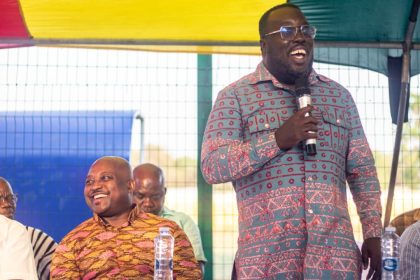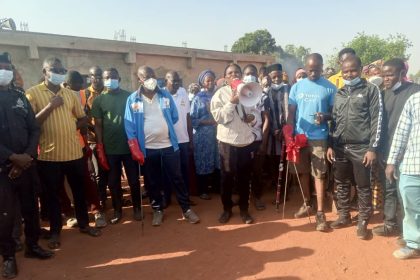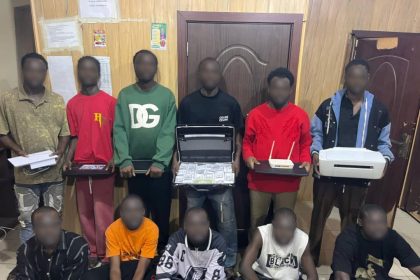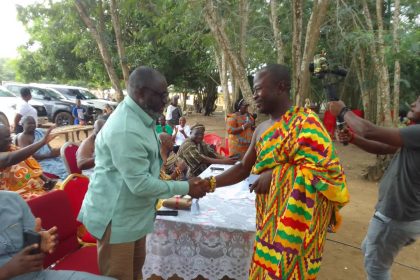The African Commission on Human and Peoples’ Rights (ACHPR) has declared Ghana’s illegal mining crisis, popularly known as galamsey, a human rights emergency.
It warned that the phenomenon had become entrenched through reported political complicity and compromised security enforcement.
The warning was delivered at the end of a four-day Promotion Mission to Ghana, during which a high-level delegation of the Commission engaged government officials, civil society groups, and development partners from September 29 to October 2, 2025.
The mission, made up of Commissioners responsible for extractive industries, women’s rights, torture prevention, detention, and socio-economic rights, assessed Ghana’s human rights situation and the impact of extractive activities.
Commissioner Janet Ramatoulie Sallah-Njie, Commissioner responsible for the promotion of human rights in Ghana, and Special Rapporteur on the Rights of Women in Africa, who shared preliminary findings of the delegation at a press conference at the Ministry of Foreign Affairs in Accra, said that ‘galamsey’ had grown into one of the gravest threats to the country’s stability and human rights commitments.
While the mission commended Ghana for its progressive reforms in justice, security, and social protection, it identified galamsey as a challenge of alarming proportions that undermined the environment, livelihoods, and fundamental rights.
The Commission’s preliminary findings, which paint a stark picture, pointed out that rivers and streams in mining zones had been polluted, depriving communities of safe water and threatening public health.
Cocoa farms and other agricultural lands have been devastated, raising fears of food insecurity and economic hardship for farmers.
The delegation reported that ‘galamsey’ had also triggered a social crisis, as children in mining communities abandoned classrooms in favour of hazardous mining work.
“This jeopardises not only their right to education but risks creating a generation trapped in cycles of illiteracy and exploitation,” the Commissioners observed.
The mission further highlighted accounts of trafficking and sexual exploitation in galamsey areas, and stated that, women and girls, already vulnerable due to poverty, faced severe reproductive health risks and abuse.
The health of children growing up in polluted mining zones is also in jeopardy, with long-term effects linked to chemical contamination.
Equally troubling is the evidence of political and security force complicity in the persistence of ‘galamsey’.
Stakeholders told the delegation that certain political actors and some security personnel deployed to stop illegal mining were instead benefitting from the activity.
This, the Commission said, had eroded public trust in official interventions and entrenched impunity, allowing ‘galamsey’ to thrive despite repeated government crackdowns.
Recognising the scale of the crisis, the Commission issued a strong call for Ghana to adopt a coordinated, multi-sectoral approach to eliminate illegal mining.
It urged the government to consider declaring key mining regions as security zones to allow decisive and sustained action.
The Commissioners recommended the establishment of a high-level, independent investigation with strict anti-corruption safeguards to dismantle networks of political and security actors profiting from galamsey.
They stressed that such an inquiry must be transparent and independent to restore confidence in state-led interventions.
The mission’s recommendations went beyond enforcement to address the socio-economic roots and consequences of galamsey.
Public health was identified as an urgent priority, with a call for independent health impact assessments in affected areas and immediate treatment for communities exposed to mercury poisoning and related conditions.
On education, the Commission proposed a comprehensive programme of scholarships and school rehabilitation in mining areas to stem dropout rates and rescue children already involved in mining.
“The future of Ghana’s children cannot be sacrificed for short-term gains,” the mission emphasised.
To safeguard farmers, the Commission urged the creation of an emergency support fund for cocoa farmers and the rollout of a national land and water rehabilitation programme.
It also called for the development of sustainable livelihood alternatives through vocational training, youth employment initiatives, and the formalisation of small-scale mining.
Special emphasis, it said, should be placed on engaging vulnerable groups such as the youth and migrant head porters known as Kayayei, who were often drawn into illegal mining out of desperation.
The delegation argued that only by creating dignified alternatives and expanding opportunities in education, health, and employment could Ghana break the cycle of poverty and exploitation that fed the galamsey phenomenon.
The Commission recognised Ghana’s broader commitment to human rights but warned that the persistence of ‘galamsey’ could erode much of the progress made.
“This is not merely an environmental issue; it is a human rights crisis undermining the dignity, safety, and future of millions of Ghanaians,” Commissioner Sallah-Njie stated.
While the mission’s full report will be presented to the African Commission for adoption before being transmitted to the Government of Ghana, it urged swift action to confront ‘galamsey’ with the urgency and coordination it demands.
GNA






